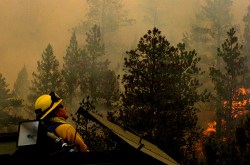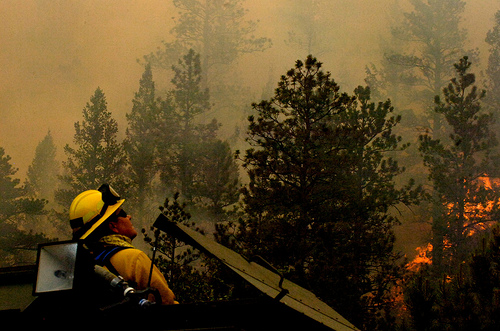
Photo by USAF.
The wildfires raging through Colorado and the West are unbelievable. As of yesterday there were 242 fires burning, according to the National Interagency Fire Center. Almost 350 homes have been destroyed in Colorado Springs, where 36,000 people have been evacuated from their homes. President Obama is visiting today to assess the devastation for himself.
Obviously the priority is containing the fires and protecting people. But inevitably the question is going to come up: Did climate change “cause” the fires? Regular readers know that this question drives me a little nuts. Pardon the long post, but I want to try to tackle this causation question once and for all.
What caused the Colorado Springs fire? Well, it was probably a careless toss of a cigarette butt, or someone burning leaves in their backyard, or a campfire that wasn’t properly doused. [UPDATE: Turns out it was lightning.] That spark, wherever it came from, is what triggered the cascading series of events we call “a fire.” It was what philosophers call the proximate cause, the most immediate, the closest.
All the other factors being discussed — the intense drought covering the state, the dead trees left behind by bark beetles, the high winds — are distal causes. Distal causes are less tightly connected to their effects. The dead trees didn’t make any particular fire inevitable; there can be no fire without a spark. What they did is make it more likely that a fire would occur. Distal causes are like that: probabilistic. Nonetheless, our intuitions tell us that distal causes are in many ways more satisfactory explanations. They tell us something about the meaning of events, not just the mechanisms, which is why they’re also called “ultimate” causes. It’s meaning we usually want.
When we say, “the fires in Colorado were caused by unusually dry conditions, high winds, and diseased trees,” no one accuses us of error or imprecision because it was “really” the matches or campfires that caused them. We are not expected to say, “no individual fire can be definitively attributed to hot, windy conditions, but these are the kinds of fires we would expect to see in those conditions.” Why waste the words? We are understood to be talking about distal causes.
When we talk about, not fires themselves, but the economic and social impacts of fires, the range of distal causes grows even broader. For a given level of damages, it’s not enough to have dry conditions and dead trees, not even enough to have fire — you also have to take into account the density of development, the responsiveness of emergency services, and the preparedness of communities for prevention or evacuation.
So if we say, “the limited human toll of the Colorado fires is the result of the bravery and skill of Western firefighters,” no one accuses us of error or imprecision because good firefighting was only one of many contributors to the final level of damages. Everything from evacuation plans to the quality of the roads to the vagaries of the weather contributed in some way to that state of affairs. But we are understood to be identifying a distal cause, not giving a comprehensive account of causation.
What I’m trying to say is, we are perfectly comfortable discussing distal causes in ordinary language. We don’t require scientistic literalism in our everyday talk.
The reason I’m going through all this, you won’t be surprised, is to tie it back to climate change. We know, of course, that climate change was not the proximate cause of the fires. It was a distal cause; it made the fires more likely. That much we know with a high degree of confidence, as this excellent review of the latest science by Climate Communication makes clear.
One can distinguish between distal causes by their proximity to effects. Say the drought made the fires 50 percent more likely than average June conditions in Colorado. (I’m just pulling these numbers out of my ass to illustrate a point.) Climate change maybe only made the fires 1 percent more likely. As a cause, it is more distal than the drought. And there are probably causes even more distal than climate change. Maybe the exact tilt of the earth’s axis this June made the fires 0.0001 percent more likely. Maybe the location of a particular proton during the Big Bang made them 0.000000000000000001 percent more likely. You get the point.
With this in mind, it’s clear that the question as it’s frequently asked — “did climate change cause the fires?” — is not going to get us the answer we want. If it’s yes or no, the answer is “yes.” But that doesn’t tell us much. What people really want to know when they ask that question is, “how proximate a cause is climate change?”
When we ask the question like that, we start to see why climate is such a wicked problem. Human beings, by virtue of their evolution, physiology, and socialization, are designed to heed causes within a particular range between proximate and distal. If I find my kid next to an overturned glass and a puddle of milk and ask him why the milk is spilled, I don’t care about the neurons firing and the muscles contracting. That’s too proximate. I don’t care about humans evolving with poor peripheral vision. That’s too distal. I care about my kid reaching for it and knocking it over. That’s not the only level of causal explanation that is correct, but it’s the level of causal explanation that is most meaningful to me.
For a given effect — a fire, a flood, a dead forest — climate change is almost always too distal a cause to make a visceral impression on us. We’re just not built to pay heed to those 1 percent margins. It’s too abstract. The problem is, wildfires being 1 percent more likely averaged over the whole globe actually means a lot more fires, a lot more damage, loss, and human suffering. Part of managing the Anthropocene is finding ways of making distal causes visceral, giving them a bigger role in our thinking and institutions.
That’s what the “did climate change cause XYZ?” questions are always really about: how proximate a cause climate change is, how immediate its effects are in our lives, how close it is.
There is, of course, a constant temptation among climate hawks to exaggerate how proximate it is, since, all things being equal, proximity = salience. But I don’t think that simply saying “climate change caused the fires” is necessarily false or exaggerated, any more than saying “drought caused the fires” is. The fact that the former strikes many people as suspect while the latter is immediately understood mostly just means that we’re not used to thinking of climate change as a distal cause among others.
That’s why we reach for awkward language like, “fires like this are consonant with what we would expect from climate change.” Not because that’s the way we discuss all distal causes — it’s clearly not — but simply because we’re unaccustomed to counting climate change among those causes. It’s an unfamiliar habit. As it grows more familiar, I suspect we’ll quit having so many of these tedious semantic disputes.
And I’m afraid that, in coming years, it will become all-too familiar.



